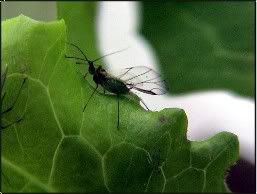
The best way to control these bugs is to keep them out of your garden to begin with. There are many pesticides that you can use to keep the bugs away, but you need to make sure they’re safe to use.
Some of the sprays can be harmful to the health of other animals and possibly small children. You want to get rid of these pests, but make sure you don’t get rid of all of them, since there are some you actually want to keep in your garden.
Some of these helpful pests, such as ladybugs and spiders, feed on the annoying insects that damage your plants. They’re essentially the best bodyguards one could have for their garden.
One of the best ways to control the insects and pests that damage the plants in your garden is by allowing helpful pests in that will drive those harmful ones away or eat them.
By planting inviting plants or “homes” for the helpful insects, you can keep the harmful ones at bay quite efficiently. Check with your local gardening center on which plants attract the good pests.
Another thing to keep in mind is to keep your garden clean. The harmful pests are often attracted to piles of leaves, grass cuttings and dense spots of weeds. These pests can thrive in those areas, so weed your garden regularly and clean up the leaves and grass cuttings that find their way into your garden.
Some organic gardeners use a hot pepper wax that they lightly spray on the leaves of their plants. The oils from the spicy contents of this wax wards off the harmful insects and other pests as well.
The wax solution is safe for your plants and doesn’t affect the produce at all, so don’t worry about “spicing” up your vegetables. As long as you properly clean them before consuming them, you won’t notice any residue.
There are some plants that give off a scent that repels those bugs and keeps them away from your precious produce. Such plants - like marigolds and the borage herb plant - are very effective at keeping those pests away from your tomato plants. Plant them nearby and watch your tomato plants grow to be healthy and robust.
Every gardener wants to see their garden thrive after putting in a lot of hours of hard work and dedication into it. No one wants to see that labor go down the drain by losing their plants to those annoying pests that move into your garden.
Before planting your garden, do your research and find the best companion plants to repel the annoying pests and the ones that invite the good insects in according to your geographic location.
By Paul Duxbury












